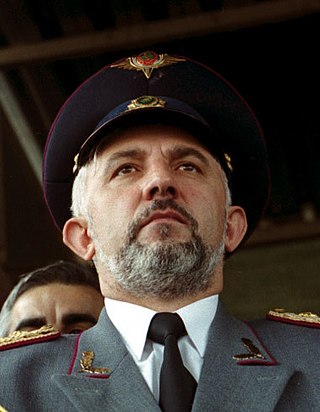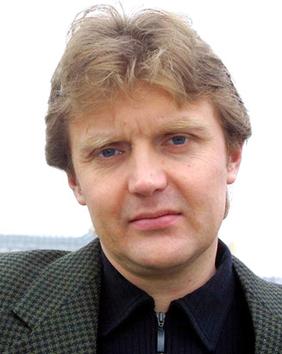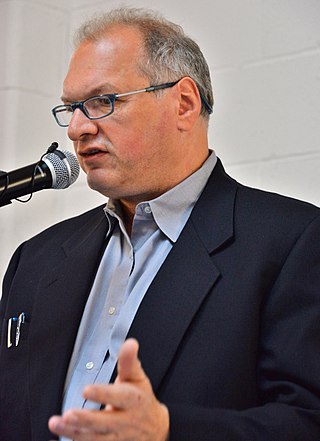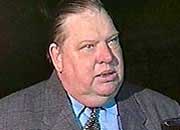Related Research Articles

Aslan (Khalid) Aliyevich Maskhadov was a Soviet and Chechen politician and military commander who served as the third president of the unrecognized Chechen Republic of Ichkeria.

The Federal Security Service of the Russian Federation is the principal security agency of Russia and the main successor agency to the Soviet Union's KGB; its immediate predecessor was the Federal Counterintelligence Service (FSK) which was reorganized into the FSB in 1995. The three major structural successor components of the former KGB that remain administratively independent of the FSB are the Foreign Intelligence Service (SVR), the Federal Protective Service (FSO), and the Main Directorate of Special Programs of the President of the Russian Federation (GUSP).

Shamil Salmanovich Basayev, also known by his kunya "Abu Idris", was a North Caucasian guerilla leader who served as a senior military commander in the breakaway Chechen Republic of Ichkeria. He held the rank of brigadier general in the Armed Forces of Ichkeria, and was posthumously declared generalissimo. As a military commander in the separatist armed forces of Chechnya, one of his most notable battles was the separatist recapture of Grozny in 1996, which he personally planned and commanded together with Aslan Maskhadov. He also masterminded several of the worst terrorist attacks that occurred in Russia.

Samir Saleh Abdullah al-Suwailim, commonly known as Ibn al-Khattab or as Emir Khattab, was a Saudi pan-Islamic jihadist. Though he fought in many conflicts, he is best known for his involvement in the First Chechen War and the Second Chechen War, which he participated in after moving to Chechnya at the invitation of the Akhmadov brothers.

The Russian apartment bombings were a series of explosions that hit four apartment blocks in the Russian cities of Buynaksk, Moscow, and Volgodonsk in September 1999, killing more than 300, injuring more than 1,000, and spreading a wave of fear across the country. The bombings, together with the Invasion of Dagestan, triggered the Second Chechen War. The handling of the crisis by Vladimir Putin, who was prime minister at the time, boosted his popularity greatly and helped him attain the presidency within a few months.

Zelimkhan Abdulmuslimovich Yandarbiyev was a writer and politician from Chechnya, who served as acting president of the breakaway Chechen Republic of Ichkeria between 1996 and 1997. Yandarbiyev was deemed by UN a suspected associate of Al-Qaida extremist group, and is the first of Chechen leader to be named part of Al-Qaida terrorist network. In 2004, Yandarbiyev was assassinated while in exile in Qatar.
Mikhail Ivanovich Trepashkin is a Russian attorney and former Federal Security Service (FSB) colonel who was invited by MP Sergei Kovalev to assist in an independent inquiry of the Russian apartment bombings in September 1999 that followed the Dagestan war and were one of the causes of the Second Chechen War. During his investigation, he was arrested by the FSB and sentenced to four years' imprisonment for "revealing state secrets". His arrest has been criticized by a number of human rights organizations and he has been called a political prisoner.
The 1999 war in Dagestan, also known as the Dagestan incursions, was an armed conflict that began when the Chechen-based Islamic International Peacekeeping Brigade (IIPB), an Islamist group led by Shamil Basayev, Ibn al-Khattab, Ramzan Akhmadov and Arbi Barayev, invaded the neighboring Russian republic of Dagestan on 7 August 1999, in support of the Shura of Dagestan separatist rebels. The war ended with a major victory for the Russian Federation and Republic of Dagestan and the retreat of the IIPB. The invasion of Dagestan served as the main casus belli alongside the series of apartment bombings in September 1999 for the Second Chechen War.

On 7 October 2006, Russian journalist, writer and human rights activist Anna Politkovskaya was shot dead in the elevator of her apartment block in central Moscow. She was known for her opposition to the Chechen conflict and for criticism of Vladimir Putin. She authored several books about the Chechen wars, as well as Putin's Russia, and received several international awards for her work. Her murder, believed to be a contract killing, sparked a strong international reaction. Three Chechens were arrested for the murder, but were acquitted. The verdict was overturned by the Supreme Court of Russia and new trials were held. In total, six people were convicted of charges related to her death.

Alexander Valterovich Litvinenko was a British-naturalised Russian defector and former officer of the Russian Federal Security Service (FSB) who specialised in tackling organised crime. A prominent critic of Russian President Vladimir Putin, he advised British intelligence and coined the term "mafia state".
Maxim Yuryevich Lazovsky was a KGB and FSB officer who became involved in underground business. According to Alexander Litvinenko and co-authors he was also suspected of participation in Russian apartment bombings in 1999, along with other crimes including murders and kidnappings.
Terrorism in Russia has a long history starting from the time of the Russian Empire. Terrorism, in the modern sense, means violence against civilians to achieve political or ideological objectives by creating extreme fear.

Yuri Georgievich Felshtinsky is a Russian American historian. Felshtinsky has authored a number of books on Russian history, including The Bolsheviks and the Left SRs, Towards a History of Our Isolation, The Failure of the World Revolution, Blowing up Russia, and The Age of Assassins.

German Alexeyevich Ugryumov was a Soviet and Russian navy and security services official. During his childhood he lived in Chelyabinsk Oblast.
The 2002 Kaspiysk bombing occurred on 9 May 2002, an attack which ripped through the military parade to commemorate the 57th anniversary of Soviet victory in the Second World War on Lenin Street in the city of Kaspiysk, Dagestan.

On February 13, 2004, Zelimkhan Yandarbiyev was assassinated when a bomb ripped through his SUV in the Qatari capital, Doha. Yandarbiyev was fatally wounded and died on the way to the hospital while his 13-year-old son Daud was seriously injured and arrived in critical condition. According to some reports, two of his bodyguards were killed as well.
Achemez Gochiyayev is a Russian citizen who was accused of organizing the Russian apartment bombings, a series of terrorist acts in 1999 that killed 307 people and led the country into the Second Chechen War. The five bombings took place during two weeks between September 4 and September 16, 1999, in Moscow, and the southern towns of Buynaksk and Volgodonsk. Gochiyayev has not been arrested or convicted and ostensibly remains a fugitive; he has not been seen since early March 2002.
The 1994 Baku Metro bombings was a series of terrorist incidents in Baku, Azerbaijan. The first attack was perpetrated at the "20 January" metro station, while the second one took place between the "28 May" and "Ganjlik" stations. As a result of the first attack, 14 people were killed and 49 wounded. The second attack resulted in 13 people killed and 42 injured.

Adam Aslanbekovich Osmayev is a Chechen brigadier general active in Ukraine. Born into a prominent Chechen family, Osmayev first acquired notability after being arrested in 2007 and accused of involvement in a plot to assassinate Chechen leader Ramzan Kadyrov. Released three days later, he fled to the United Kingdom and later settled in Ukraine. In 2012 he was further accused of masterminding an attempt to assassinate Russian President Vladimir Putin. Arrested on charges of carrying explosives and causing property damage, he was not extradited following a recommendation from the European Court of Human Rights which argued that he would face torture if returned to Russia. He was released from Ukrainian prison in 2014 and subsequently joined the Armed Forces of Ukraine, becoming commander of the Dzhokhar Dudayev Battalion in 2015.
References
- 1 2 3 Alex Goldfarb, with Marina Litvinenko Death of a Dissident: The Poisoning of Alexander Litvinenko and the Return of the KGB , The Free Press, 2007, ISBN 1-4165-5165-4
- ↑ Russian Federation: Amnesty International's concerns and recommendations in the case of Mikhail Trepashkin - Amnesty International Archived 2009-09-10 at the Wayback Machine
- ↑ "Московские новости". Archived from the original on 2012-02-29. Retrieved 2012-01-29.
- ↑ "Радиостанция "Эхо Москвы" / Передачи / Интервью / Четверг, 25.07.2002: Сергей Ковалев". Archived from the original on Feb 16, 2012.
- 1 2 "ACHIMEZ GOCHIYAYEV: RUSSIA'S TERRORIST ENIGMA RETURNS". Archived from the original on Sep 30, 2007.
- ↑ Gochiyayev's wanted page Archived 2005-03-18 at the Wayback Machine on FSB web site.
- ↑ Saradzhyan, Simon (Sep 1, 2006). "Russia: Grasping the Reality of Nuclear Terror". The Annals of the American Academy of Political and Social Science. 607 (1): 64–77. doi:10.1177/0002716206290964. S2CID 145500667 – via SAGE Journals.
- ↑ "Putin's defense sector appointees".
- 1 2 3 4 Only one explosions suspect still free Archived 2012-12-21 at archive.today , Kommersant , December 10, 2002.
- ↑ Karachayev terrorists found in the morgue, Kommersant, June 8, 2004.
- ↑ "Грани.Ру: Процесс о взрывах жилых домов: адвокат Адама Деккушева просит его полного оправдания". graniru.org.
- 1 2 "Газета.Ru – Court starts hearings into 'hexogen case'". www.gazeta.ru.
- ↑ "Archived copy". Archived from the original on 2012-02-16. Retrieved 2012-01-29.
{{cite web}}: CS1 maint: archived copy as title (link) Separatists Tied to '99 Bombings. - 1 2 Two life sentences for 246 murders Archived 2010-10-29 at the Wayback Machine , Kommersant , January 13, 2004.
- ↑ A terrorist has imprisoned a policeman, Kommersant , May 15, 2003.
- 1 2 3 4 5 6 "ПРИЧАСТНЫЕ К ВЗРЫВАМ В МОСКВЕ УСТАНОВЛЕНЫ". Archived from the original on Oct 4, 2006.
- ↑ NEWS FROM RUSSIA",Vol.VI, Issue No.18, dated 1st May 2003 Archived 2007-08-23 at the Wayback Machine
- 1 2 3 "Disrupting Escalation of Terror in Russia to Prevent Catastrophic Attacks" (PDF).[ dead link ]
- 1 2 3 4 5 6 Buinaksk terrorists sentenced to life, Kommersant , March 20, 2001.
- ↑ "JURIST | School of Law | University of Pittsburgh". www.law.pitt.edu. Archived from the original on 2010-03-07. Retrieved 2021-03-14.
- ↑ Jury acquitted a Buinaksk suspect, Lenta.Ru, 2006 Jan 24.
- ↑ Jury acquitted a Buinaksk suspect again, Lenta.Ru, 2006 November 13.
- ↑ Khattab said: Your task is small Archived 2007-11-05 at the Wayback Machine , Kommersant , November 13, 2006.
- ↑ One More Participant of Terrorist Act in Buinaksk, Dagestan, Detained in Almaty, Republic of Kazakhstan Archived 2012-03-18 at the Wayback Machine
- ↑ They should be blown up, not put on trial, Kommersant , April 10, 2002.
- ↑ "David Satter - House committee on Foreign Affairs" (PDF). Archived from the original (PDF) on Sep 27, 2011.
- ↑ David Satter. Darkness at Dawn: The Rise of the Russian Criminal State. Yale University Press. 2003. ISBN 0-300-09892-8.
- 1 2 Vladimir Pribylovsky and Yuri Felshtinsky) The Age of Assassins. The Rise and Rise of Vladimir Putin, Gibson Square Books, London, 2008, ISBN 1-906142-07-6;
- ↑ Tegenlicht documentary VPRO 2007, In Memoriam Aleksander Litvinenko, Jos de Putter, Moscow 2004 Interview with Anna Politkovskaya.
- ↑ "Адмирал ФСБ - Дух воинский - Православное воинство - РУССКОЕ ВОСКРЕСЕНИЕ; ?>". www.voskres.ru.
- ↑ "Center for Defense Information". Project On Government Oversight. Archived from the original on Feb 14, 2007.